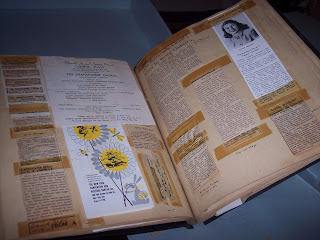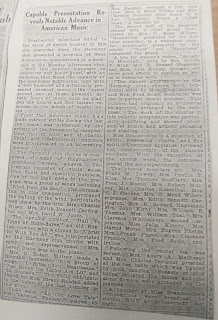Christmas Eve – the year 1906 - classical music was first broadcast on the radio from Brant Rock, Massachusetts. Over the air-waves people heard a phonograph recording of Handel’s “Largo.” Reginald Fessenden and F.W. Alexanderson were the inventors’ team who created the broadcast with Fessenden closing the program with, “Merry Christmas.”
A few
short years later in 1910 Enrico Caruso was heard live from the Metropolitan
Opera House in New York City.
Radio became a major venue for classical music and by 1920 and into the 1930s programs such as “Bell Telephone Hour,” “Voice of Firestone,” and “Cities Service Concerts” filled the air with classical music.
Families gathered around
their radios to listen to great performances by the top classical musicians of
the day.
Those 20 years of broadcasts began the era of artists,
whether a composer, conductor, soloist, orchestra or chorus, earning royalties
from radio performances. Up to that
point, publishers paid composers royalties on the sales of their music. But radio – no one knew what to expect. Formulating guidelines, rules and payments
became a pressing issue.
In early 1923 over WJZ in Newark, New Jersey, Gena Branscombe had two fifteen minute segments of her music performed live. In her March 23, 1923 letter to Mr. Austin at Arthur P. Schmidt Publishing , she said:
“Am ever so thrilled about it – The possibilities are so limitless!”
She
hoped Mr. Austin would listen in, he didn’t own a radio, then asked if his
friend in London would get up at 3 AM to listen if the broadcast would get
across the pond.
Thus began many years of Gena’s music being heard on the
radio. Her Branscombe Choral,
violinists, pianists and famous singers of her era were heard live via broadcasts
on WJZ, WNYC, WEAF and WOR. Miss
Branscombe understood the importance of this promotional publicity which might
lead to sales of her music and royalties paid to her.
Radio broadcasts for Miss Branscombe were not an easy path
to her copyrighted music being performed.
This new musical venue with great possibilities for the future had road
blocks for the composer.
In the 1930’s contentious letters between Gena and Mr. Austin
regarding radio broadcasts of her music were nearly a daily occurrence. Permission from Arthur P. Schmidt Publishing,
who held the copyrights to her music, had to be sent to the radio stations
where her music was to be performed.
Radio stations refused singers the performance of works
published by Schmidt explaining they had not received the permission letters.
From her May 22, 1930 letter to Mr. Austin she wrote:
|
“And now for something that’s on my mind. Over two weeks ago a baritone came to me
and told me that all his Schmidt numbers were being taken off – on his
broadcasting program of the National Broadcasting Co. |
On July 23, 1930, after many letters back and
forth, Mr. Austin replied,
|
“In any case, as we wrote you recently, any broadcasting you wish to have done of your compositions meets with our entire approval.” |
|
“I wasn’t asking permission to have my things done, I was telling you
of a condition which affects unfavorably all
the works of the Schmidt catalogue, my own, included. I have been told that this has been caused
by some attitude on your part. |
The beginning of classical music on radio broadcasts was not
easy for the creative spirit. Yet, through the
trials and tribulations of developing rules and laws to protect artists, a path
was laid down for today’s musicians. All
is not perfect as we know from news reports that performers accuse producers,
agents, record companies and others of fraud.
This is sad as we artists work long hard hours to share the soulful depth of our art. Being paid for that
work….. ART TAKES WORK….is essential to our livelihood and the ongoing endeavor of
artistic creativity.
· Letters between Gena Branscombe and Arthur P. Schmidt Publishing Company are held in the Arthur P. Schmidt Publishing Company business papers at the Library of Congress.









.jpg)



.jpg)



































